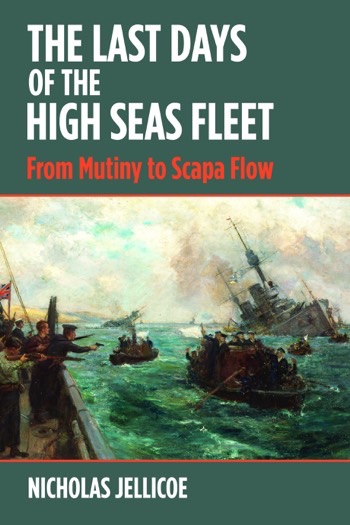
The Last Days of the High Seas Fleet. From Mutiny to Scapa Flow. By Nicholas Jellicoe. Seaforth Publishing, Barnsley, 2019.
Reviewed by David Hobbs
On 21 June 1919 the interned warships of the German High Seas Fleet were scuttled by their crews in Scapa Flow and the centenary of this dramatic event has been marked in 2019 by a number of books and events. Of these, I was delighted to be given the opportunity to review Nicholas Jellicoe’s book The Last Days of the High Seas Fleet. The author is the grandson of Admiral Jellicoe and he has followed a career in communications, notably with Rolex. He therefore speaks fluent German and this undoubtedly helped his research and understanding of the High Seas Fleet mutinies of 1918 and the scuttle in 1919.
His earlier book Jutland; The Unfinished Battle, also published by Seaforth, was critically well reviewed in Australia, the UK, Germany and the USA.
There is actually considerably more detail in this book than its name suggests. Germany’s creation of a blue water navy is summarised before the detailed descriptions of the mutinies that rocked the fleet in the autumn of 1918 and the voluntary internment of the majority of the nation’s surface fleet in November 1918. It goes much further, however, and gives an idea of the caretaker crews’ life in the interned ships, a detailed account of how the scuttle was organised and ordered by Admiral Von Reuter and how a number of German sailors were shot and killed as the Royal Navy belatedly tried to prevent ships from sinking. There is also a detailed look at international perspectives on the scuttle, the Washington Naval Conference that followed it, the eventual salvage of many of the sunken German ships by Cox & Danks and, later, Metal Industries before it concludes with thoughts on Scapa Flow as a focal point in naval history.
This is an important, objective work that sheds new light on a period of history that has often been overshadowed by the conflicts that preceded and followed it. Jellicoe’s ability to speak German has enabled him to quote German sources verbatim together with his own translations so that misunderstandings cannot be said to be an issue.
I found one of the most interesting details clarified by the author was the exact status of the German ships that were sailed to Rosyth and then Scapa Flow by their skeleton crews. They had not been surrendered by the new German Government, although U-boats had done so at Harwich under the terms of the Armistice that came into effect on 11 November 1918. The original phrasing of Articles XXII and XXIII in the Armistice terms had included the word ‘surrender’ but this was not acceptable to the German negotiators and the articles were re-written to read ‘…shall forthwith be disarmed and thereafter interned…and placed under the surveillance of the Allies and the United States of America, only caretakers being left on board’.
Thus the German ships sailed into a state of ‘voluntary internment’ on 21 November 1918, a legal point that retained them as sovereign German property. Thus the British were denied the right to put sentries on board that would have stood a greater chance of preventing the scuttle or, better still, replacing the skeleton German crews with Allied sailors as caretakers rather than maintaining surveillance until the fate of the ships was decided at Versailles. The day the German ships arrived off May Island in the Firth of Forth is described by Captain James of HMAS Australiaas ‘a beautiful day for the North Sea in November, a haze with a visibility of four miles, the sun trying its best to dispel the mist, a slight breeze with a calm sea’ in a quotation on page 79 that captures the moment when the line of rusty German ships first came into sight between the columns of the Grand Fleet.
The author has clearly been at pains to discover exactly what happened during this eventful period and to explain the different, and sometimes surprising, attitudes displayed by the various personalities who played out the scenes that are described with clarity and respect. I had thought that earlier works, including contemporary accounts, had given me a reasonable understanding of the German Fleet’s internment but this book has added considerably to my knowledge. I was also struck by how well the delicate issues raised have been received in Germany. The events the author describes still have an impact on our modern world and I found some passages to be so absorbing that it was difficult to put the book down. I thoroughly recommend it to naval professionals, who may ponder what they would have done in Von Reuter’s position, students of naval history in general or anyone interested in the wider impact of the peace negotiations in Paris and the Treaty of Versailles. The inability of politicians to achieve the ideal solution to an issue is not a new phenomenon.



